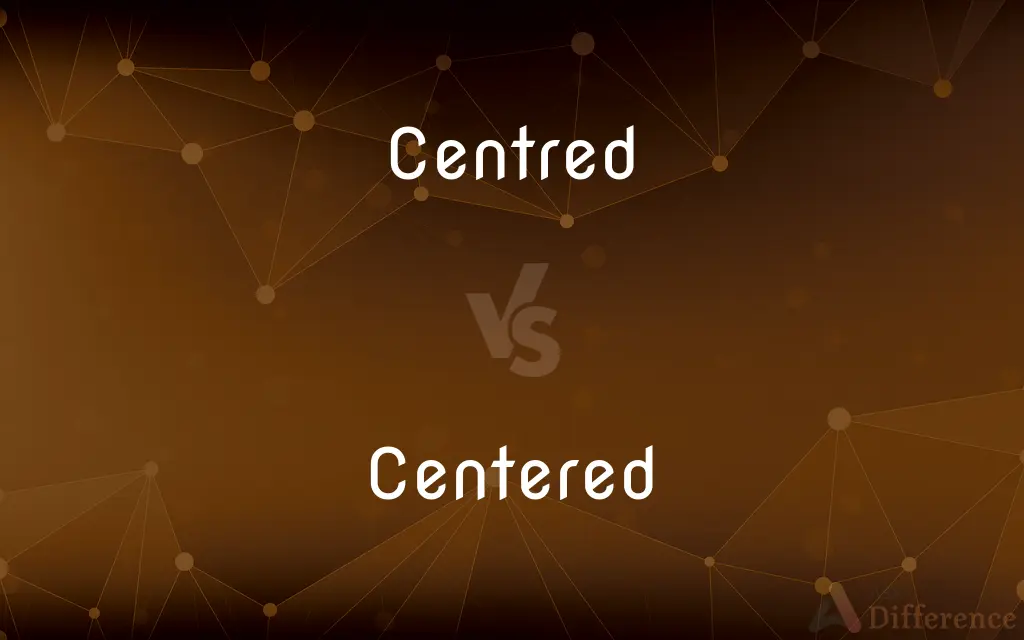Centred vs. Centered — What's the Difference?
By Tayyaba Rehman — Updated on August 22, 2023
Centred is the British spelling while centered is the American spelling for the past participle of the verb "centre/center," meaning to place or position something in the middle.

Difference Between Centred and Centered
Table of Contents
ADVERTISEMENT
Key Differences
Centred and centered essentially carry the same meaning, but their distinction lies in regional usage. Both are derived from the verb "to centre" or "to center," which means to place or set (something) in a central position. In many contexts, particularly in written language, the choice between centred and centered can be indicative of the author's regional background or the intended audience.
In British English, the standard spelling is "centre," and when the word is used in its verb form in the past tense or as a past participle, it becomes "centred." For example, in British literature or media, one might read, "The discussion was centred around climate change." This British preference extends to other derivatives, such as "centring."
On the other hand, in American English, "center" is the preferred spelling. Consequently, the verb in its past tense or past participle form becomes "centered." An American might say, "The game centered on a powerful protagonist." Just as with the British preference, this extends to other derivatives in American English, like "centering."
While both centred and centered convey the idea of positioning something in the middle or making something central, their spelling variations represent linguistic nuances stemming from regional preferences.
Comparison Chart
Regional Usage
British English
American English
ADVERTISEMENT
Derived from
Centre
Center
Example Sentence
The debate was centred on ethics.
The topic centered around history.
Past Participle of
Centre
Center
Use in Other Derivatives
Centring
Centering
Compare with Definitions
Centred
Positioned in the middle.
The artwork was centred on the wall.
Centered
Positioned equidistantly from boundaries.
The pin was centered in the cushion.
Centred
Placed or situated in the centre.
Centered
Placed in the center.
The text was centered on the page.
Centred
Equally distant from extremes.
The point was centred between the two ends.
Centered
Being calm and self-assured.
She remained centered despite the chaos.
Centred
Focused or concentrated.
Her life is centred around her children.
Centered
Constituting a focal point.
The meeting centered around budget discussions.
Centred
Having a specified subject as the most important or focal element
A child-centred school
Centered
Having a specified subject as the focal point.
His research centered on ancient civilizations.
Centred
Balanced or stabilized.
He felt more centred after the meditation session.
Centered
Being at or placed in the center.
Centred
Being the main point of attention.
The conference was centred on sustainability.
Centered
Having a specified center. Often used in combination
A soft-centered candy.
A yellow-centered daisy.
Centred
Same as centered.
Centered
Self-confident, stable, and well-balanced
"He's a centered guy. He's always seemed to know what he wanted, and gone after it in a concrete way" (Vanity Fair).
Centred
Concentrated on or clustered around a central point or purpose
Centered
Middlemost; located at the center
Centred
(of a chocolate) having a centre or filling of a specified type
A soft-centred chocolate
Centered
Emotionally stable, calm, serene; having a balanced mind
Centred
(of a person) well balanced and confident or serene
She is very together, very domesticated, very centred
Centered
Simple past tense and past participle of center
Centred
Simple past tense and past participle of centre
Centered
Being or placed in the center.
Centred
Alternative spelling of centered
Centered
Concentrated on or clustered around a central point or purpose.
Centered
Being or placed in the center
Centered
Concentrated on or clustered around a central point or purpose
Common Curiosities
What is the primary distinction between centred and centered?
Centred is the British spelling, and centered is the American spelling for positioning something in the middle.
Is there a difference in pronunciation between centred and centered?
Generally, the pronunciation is the same, but regional accents might introduce subtle differences.
Do both words have the same meaning?
Yes, both words signify positioning or focusing something in the center or middle.
Are there any contexts where one form might be more acceptable than the other regardless of regional differences?
Generally, the regional preference holds, but in some global or international contexts, American English might be more prevalent.
Are there other spelling differences like centred and centered between British and American English?
Yes, many words have different spellings, such as "colour" (British) vs. "color" (American).
Is the usage restricted to certain contexts or genres?
Both versions are used across genres, but the choice often depends on the writer's background or the intended audience.
When writing for a global audience, which form should I use?
Consider the preferences of your primary audience or adhere to a specific style guide if one is provided.
Does the difference between centred and centered apply to other forms of the word?
Yes, it extends to various derivatives, like "centre/center" and "centring/centering."
How do the words "centring" and "centering" relate to centred and centered?
"Centring" is the British version, and "centering" is the American version, referring to the act of placing something in the center.
In spoken English, how can one identify if someone used centred or centered?
In regular conversation, it's challenging to distinguish based on pronunciation alone. It's typically evident in written form.
Share Your Discovery

Previous Comparison
Casualty vs. Accident
Next Comparison
Ooyah vs. HooyahAuthor Spotlight
Written by
Tayyaba RehmanTayyaba Rehman is a distinguished writer, currently serving as a primary contributor to askdifference.com. As a researcher in semantics and etymology, Tayyaba's passion for the complexity of languages and their distinctions has found a perfect home on the platform. Tayyaba delves into the intricacies of language, distinguishing between commonly confused words and phrases, thereby providing clarity for readers worldwide.















































